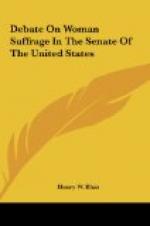The appeal by those who have it not must be made to those who are asked to part with a portion of their own power, and it is not strange that human nature, which is an essential element in the male sex, should hesitate and delay to yield one-half its power to those whose cause, however strong in reason and justice, lacks that physical force which so largely has been the means by which the masses of men themselves hare wrung their own rights from rulers and kings.
It is not strange that when overwhelmed with argument and half won by appeals to his better nature to concede to woman her equal power in the state, and ashamed to blankly refuse that which he finds no reason for longer withholding, man avoids the dilemma by a pretended elevation of his helpmeet to a higher sphere, where, as an angel, she has certain gauzy ethereal resources and superior functions, occupations, and attributes which render the possession of mere earthly every-day powers and privileges non-essential to woman, however mere mortal men themselves may find them indispensable to their own freedom and happiness.
But to the denial of her right to vote, whether that denial be the blunt refusal of the ignorant or the polished evasion of the refined courtier and politician, woman can oppose only her most solemn and perpetual appeal to the reason of man and to the justice of Almighty God. She must continually point out the nature and object of the suffrage and the necessity that she possess it for her own and the public good.
What, then, is the suffrage, and why is it necessary that woman should possess and exercise this function of freemen? I quote briefly from the report of the committee:
The rights for the maintenance of which human governments are constituted are life, liberty, and property. These rights are common to men and women alike, and whatever citizen or subject exists as a member of any body-politic, under any form of government, is entitled to demand from the sovereign power the full protection of these rights.
This right to the protection of rights appertains to the individual, not to the family alone, or to any form of association, whether social or corporate. Probably not more than five-eighths of the men of legal age, qualified to vote, are heads of families, and not more than that proportion of adult women are united with men in the legal merger of married life. It is, therefore, quite incorrect to speak of the state as an aggregate of families duly represented at the ballot-box by their male head. The relation between the government and the individual is direct; all rights are individual rights, all duties are individual duties.
Government in its two highest functions is legislative and judicial. By these powers the sovereignty prescribes the law, and directs its application to the vindication of rights and the redress of wrongs. Conscience and intelligence




